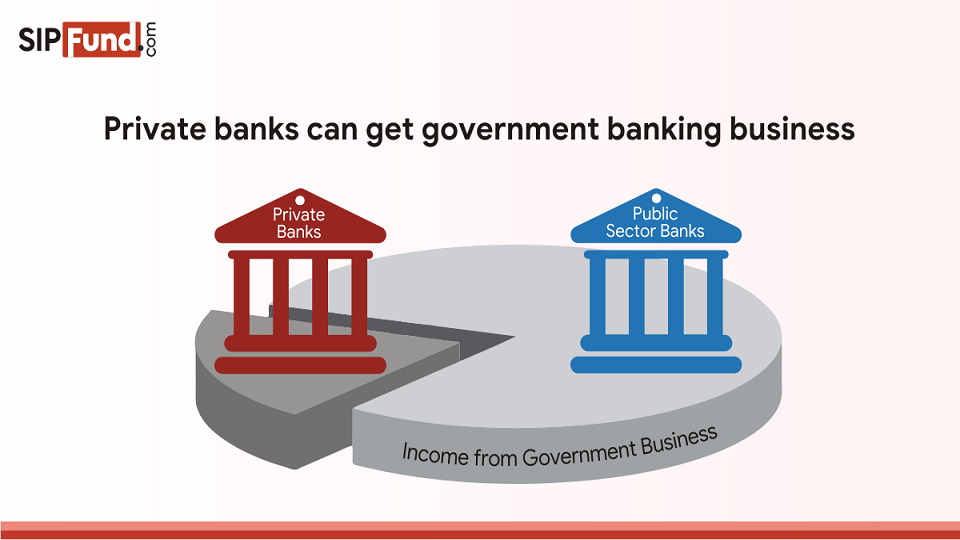
Private Banks Are Allowed To Undertake Government Businesses
Finance Minister Nirmala Sitharaman proposed to remove the embargo from private sector banks. Private sector banks have been given the authority to conduct banking transactions like collection of taxes and payment of pensions.
Why this has been done?
Public sector banks have a larger share in all government banking transactions which did not leave any scope for private sector banks to participate. The Central Bank of India, RBI had barred private banks to carry out government businesses except few like Axis bank. The reasons cited by the Finance minister and other concerned persons of Department of revenue and Expenditure are as follows:
What are the functions performed by public sector banks for government?
Out of all the functions performed by Reserve Bank of India, banker to government is also a function which RBI undertakes. Reserve Bank of India appoints public sector banks under section 45 of the RBI Act, 1934. These appointed banks undertake all banking related transactions of government. These banks collect revenue receipts, disburse pensions, collects taxes and non -taxes payments on behalf of government. These banks get commission for their services in return from the RBI. The commission per transactions paid by RBI is given below:
| COMMISSION PAID TO BANKS BY RBI | |
|---|---|
| Type of Transaction | Revised Rate |
| Receipts (physical mode) | ₹40 per transaction |
| Receipts (e-mode) | ₹9 per transaction |
| Pension payments | ₹75 per transaction |
| Payments other than pension | 6.5 paise per ₹100 |
Who is the winner?
Private Banks come out as clear winners because of this decision. Since these banks will be able to undertake banking business for state and central government, a large chunk of government accounts will move to private sector banks from public sector banks. There is no denying of the fact that private banks are quick to internalize new technologies to make their processes more efficient. These banks are happy with finance minister’s decision as it seems to be a progressive development for the growth of Indian economy. Private Banks are known for their better services and innovative products and it will get a positive nudge since they will be competing to get the government to open its account.
Who is loser?
Public sector banks are loser in this scenario. They used to handle various government accounts like Income tax, state trading corporation, other accounts related to various Government schemes. However, private sector banks will be sharing the gains as profits will get split between private and public sector banks, but the pressure of social banking will remain with public sector banks. Government holds majority of shares in public sector banks therefore these banks bear the burnt in the name of social banking pressure These banks are nodal banks for implementing the central sector schemes and centrally sponsored schemes in return of just the float money. For example- Approximately 42 crores of Jan Dhan Yojana accounts were opened by PSBs while 1.25 crores account have been opened by private sector banks. Since most of these accounts continue to be zero balance account, banks must bear the costs of maintaining these accounts.
It is unfair for public sector banks because on one side government pushes them hard to meet the targets of social welfare schemes and on the other hand government is shifting its account to private banks. These banks will lose out on all the commission which they used to get by performing transactions for the government accounts.
What are the views of Bank Unions?
Bank Unions are urging the government to take back this decision as it will have a negative impact on the profitability of banks. This decision is not welcomed by the Unions. They think amidst their struggle with NPAs another shock has been given by the government which is not seen as positive for Public sector banks. These banks cross subsidize the costs related with implementation of social sector schemes since lesser rate of interest loans to priority sector lending has a huge cost to state run banks It will become difficult for state run banks to advance loans to priority sectors at lesser rates which will again eat up their margins
Conclusion
Government has proposed this, but it has not been implemented yet. The real consequence of this decision is yet to be seen. However, some experts are of the opinion that government’s transactions are increasing in volumes so there is healthy space for both private and public sector to participate for sustainable economy. Another perspective related to this decision is that private banks will not indulge in routine transactions for government because there is very less money in it, rather they will look at carrying out transactions for the allotment of funds to various ministries as it will be more lucrative to private banks.

